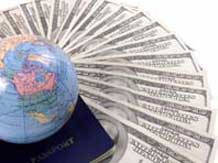
In 10 years, developing nations lost $5.86 trn
Even as developing countries struggle to bring back illicit money stashed abroad, Global Financial Integrity (GFI) has brought out a startling report. Between 2001 and 2010, developing countries lost $5.86 trillion, owing to tax evasion, crime and corruption, the report said. India recorded an outflow of $123 billion. GFI said this money had flowed to tax havens and banks in advanced countries. In 2010, 150 developing countries recorded illicit outflows of $858.8 billion to tax havens. This was below the all-time high of $871.3 billion in 2008. In 2009, the outflow stood at $776.0 billion. According to GFI’s report, ‘Illicit Financial Flows From Developing Countries: 2001-2010’, for 2010, India did not rank among the top 20 countries, in terms of outflows. The report was co-authored by GFI lead economist Dev Kar and GFI economist Sarah Freitas. With illegal outflows of $420.36 billion in 2010 alone, China was the top illicit capital exporter during the decade. For the entire 10-year period, India was ranked eighth. Countries such as India are struggling to find ways to tackle illicit outflows and bring back such funds lying abroad. India is embroiled in tax rows with several companies, including Vodafone, Shell, Nokia, IBM and Sanofi-Aventis. It is also revising its double taxation avoidance agreements with Mauritius and other countries. “Astronomical sums of dirty money continue to flow out of the developing world into offshore tax havens and developed country banks,” said GFI Director Raymond Baker. He blamed offshore secrecy jurisdictions and developed Western economies for facilitating illicit outflows from developing countries. “This is an astronomically large amount of money. We’re talking about nearly $6 trillion, which could have been invested in healthcare, education, and infrastructure in the world’s poorest countries. Nearly $6 trillion could have been used to pull people out of poverty and save lives,” he said. The estimates are conservative, as these don’t include trade mispricing in services, same-invoice trade mispricing, hawala transactions and dealings conducted in bulk cash, Kar said. “This means much of the proceeds of drug trafficking, human smuggling and other criminal activities, which are often settled in cash, are not included in these estimates.” In its latest edition, The Economist carried a cover page editorial and a 10-article expose on the damaging role of anonymous shell companies, banking secrecy and lax money laundering regulations and enforcement in the US, the UK and offshore tax havens. The magazine flayed developed countries, including the US and the UK, for complacency in dealing with illicit capital flows headed to leading tax havens. There are 50-60 tax havens, concentrated primarily in the Caribbean, Europe, the Indian and Pacific oceans and regions in the US (such as Delaware and Miami). These help millions of paper companies evade taxes in their respective countries. The magazine also urged Western economies to “focus…on cleaning up their own backyards and reforming their tax systems”.
Related Posts
Foreign cigarettes worth Rs 20.80 lakh seized by Assam Rifles in Mizoram’s Champhai
Champhai (Mizoram) , September 24 (ANI): The Assam Rifle seized a huge quantity...
FDA seizes substandard food products worth more than Rs 3 cr from company in Navi Mumbai
Thane, Nov 13 (PTI) Officials of the Food and Drug Administration (FDA) seized...
Fake apparel selling, eight traders held.
Vadodara: Eight traders were arrested from Tibetan Market at Rajmahal Road on...
Maharashtra: Raw Materials Worth ₹40 Lakh Seized From Talegaon After Counterfeit ‘Gold Flake’ Cigarettes Raid At Karjat Farmhouse; Owner Absconding
Navi Mumbai: Following the raid into a farmhouse that manufactured cigarettes...




